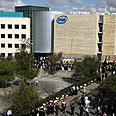
We are talking about a very liberal place: The Commonwealth of Massachusetts, home of the Kennedy family and two recent Democratic presidential candidates. Of course, I am describing the 1960s and 70s, but still, that was a very advanced and cultured society. I would even venture to say: More cultured, more advanced than it is today - and more than we are becoming, here and now in Israel.
The furor over the operation of Intel’s plant in Jerusalem on Shabbat has again catapulted into public view the question of what is to be the nature of Shabbat in our society. How should it differ from the rest of the week? What is the purpose of a shared weekly day of rest?
Deliberations about Intel could devolve into another in a series of struggles against bullying and violence by factions of the haredi sector. If we concentrate on that issue alone, though, we will miss an opportunity to engage in a more profound and, ultimately, more significant discourse about the character of the society in which we want to live.
In a society in which those who control wealth hold sway - and no one doubts any longer whether that is a fair description of Israel - who will remind us that all around us is a universe of wonders? When can we relate to the world as a gift whose beauty and richness we should enjoy?
Abraham Joshua Heschel (1907-1972) taught us that the Shabbat of Jewish tradition is first and foremost a refuge from the pursuit of profit. Six days a week, the world is a place we try to reshape and exploit in order to enrich ourselves in material terms. That is legitimate: The Torah also tells us, “Six days shall you labor.”
All of us lose
However, one day of the week is dedicated to a different view of reality: That this world was created to be a Paradise, where Adam and Eve are told that their task is “to work it and to guard it” (Gen. 2:15). We have the privilege of living on this marvelous planet and wresting from it what we can to satisfy our needs and desires, but only if we take care of it at the same time.
Shabbat, then, is an antidote to one of the poisons of modern industrial or post-industrial society, which alienates us from nature.
In a society in which wealth holds sway, who will remind us that “human capital” is not measured solely by its contribution to the Gross National Product? When can we relate to every person we meet as the embodiment of the divine image and not as a means to enlarging our bank account?
One cannot sustain at every moment, in every encounter, an “I-Thou” relationship of the sort that Martin Buber (1878-1965) taught us to strive for. Sometimes there’s no alternative to relating in an alienated, non-empathetic way toward others. Our goal, though, should be to widen the circle of those for whom we feel kinship and identification. Shabbat coaxes us in that direction when it distances us from our work and from trade.
Shabbat, then, is an antidote to another of the poisons of modern industrial or post-industrial society, which alienates us from each other.
The Intel workers who work on Shabbat will profit. They may even profit quite a bit. Intel’s shareholders, of whom I am one, will profit as well. That’s precisely the point, since we are not talking here about the provision of essential services.
There will be, then, some who profit, but there will be far more losers: All of us, collectively. In a country where there is no respite from the clang of the cash register, we won’t be able to hear the birds chirping. In a country where one’s gaze is fixed continually on the bottom line, we won’t ever see each other’s faces.
Rabbi Peretz Rodman is a Masorti (Conservative) rabbi and chairs the public affairs committee of Israel’s Masorti Movement. He lives in Jerusalem















